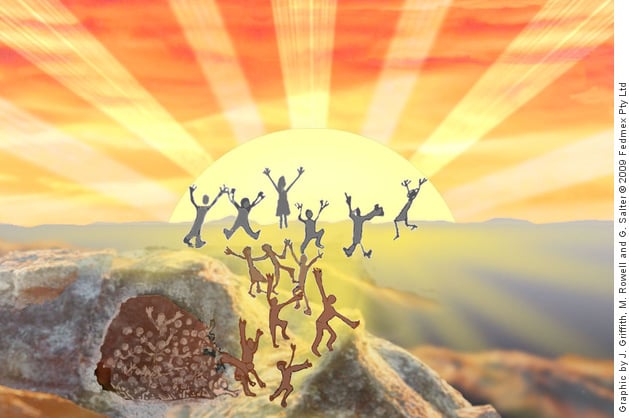Chapter 1
Summary of the contents of FREEDOM
Chapter 1:1 Freedom from the human condition
39This book liberates you, the reader, and all other humans from an underlying insecurity and resulting psychosis that all humans have suffered from since we became a fully conscious species some two million years ago.
40This underlying insecurity and psychosis that exists within every human is the product of a very deep anxiety, an uncertainty, of not knowing why, when the ideals of life are so obviously to be cooperative, loving and selfless, are humans so competitive, aggressive and selfish. Certainly, we have relied heavily on the excuse that our behaviour is no different to that seen in the animal kingdom—that we humans are competitive, aggressive and selfish because of our animal heritage. We have argued that we are, as Lord Alfred Tennyson put it, ‘red in tooth and claw’—a victim of savage animal instincts that compel us to fight and compete for food, shelter, territory and a mate; that we are at the mercy of a biological need to reproduce our genes. But this reason that biologists, including the most celebrated contemporary biologist, the Harvard-based Edward (E.) O. Wilson, have been perpetuating cannot be the real cause of our competitive, divisive behaviour because descriptions of human behaviour, such as egocentric, arrogant, inspired, depressed, deluded, pessimistic, optimistic, artificial, hateful, cynical, mean, immoral, brilliant, guilt-ridden, evil, psychotic, neurotic, alienated, all recognise the involvement of our species’ unique fully conscious thinking mind—that there is a psychological dimension to our behaviour. Humans have suffered not from the genetic-opportunism-based, non-psychological animal condition, but the conscious-mind-based, PSYCHOLOGICALLY troubled HUMAN CONDITION.
41Of course, in the absence of understanding, we had no choice but to come up with some excuse for why we are the way we are in order to cope with the negative implications of being divisively instead of cooperatively behaved, but we do all in truth know that the old ‘animals are competitive and aggressive and that’s why we are’ defence simply doesn’t hold water—it doesn’t explain our psychologically distressed human condition and so cannot end the pain, suffering, conflict and confusion that plagues this planet. And that is where the human race has been stalled, waiting in an increasingly distressed state for the real explanation for our psychologically troubled human condition that will finally make sense of the riddle of human life. That is, until now—because it is precisely that human-mind-liberating, psychosis-relieving REAL explanation that this book at last delivers.
42While the full description of this psychosis-addressing-and-solving, real explanation of the human condition is presented in chapter 3, a summary of it is provided here in chapter 1 to demonstrate to the reader that this is the understanding and insight that is able to end the underlying insecurity and resulting psychosis of everyone’s condition and, through doing so, transform every human into a new, human-condition-free person! Yes, this book brings about the liberation of humanity from its incarceration in the horrifically debilitating darkness of Plato’s ‘cave’ of alienating psychological denial that I have depicted in the above image and will explain later in this chapter.
43But before diving into the heart of the explanation, it needs to be emphasised that while the human condition is essentially the riddle of why humans are competitive and aggressive when the ideals are to be cooperative and loving, the deeper meaning of the human condition is more elusive. Indeed, as will be made clear in chapter 2, the human condition has been such a difficult issue for humans to think about and confront that many people now have very little idea of what the human condition actually is, thinking it refers not to the reality of our species’ immensely troubled psychology, but to the state of widespread poverty and physical hardship in human life, or to problems such as human inequality. But these problems are only superficial manifestations and aspects of the human condition. The truth is, the human condition is a much more profound and serious issue that goes to the very heart of who we are. So before I present the brief explanation of the human condition I first need to describe what the human condition really is.



